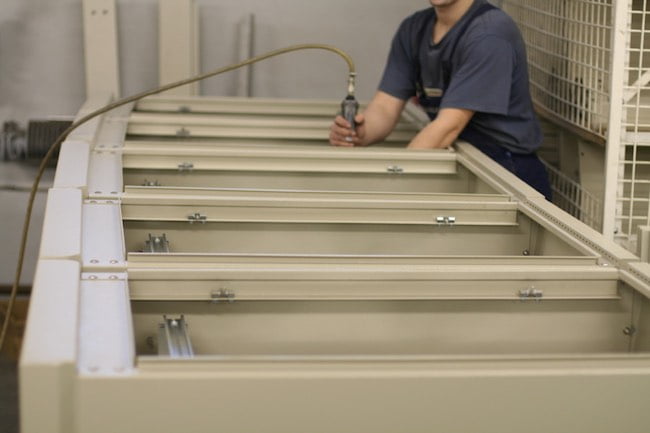How Material Plays into Enclosure Cooling Design

Depending on their designated NEMA rating, electrical enclosures—and their cooling systems—can be made from a wide range of materials, including polycarbonate plastic, powder-coated steel, stainless steel, aluminum or fiberglass-reinforced polyester.
Although plastic and fiberglass construction are allowed for NEMA-rated enclosures, the strength, impact resistance, and other properties of these materials may not comply with individual specifications.
For example, the surface of fiberglass exposed to sunlight over time tends to degrade and become unsightly, while also increasing UV absorption Polycarbonate offers less resistance to chemical corrosion than required for some NEMA applications.
For most NEMA-rated enclosures, stainless steel and powder-coated steel are the reliable material choices for an enclosure and cooling system design.
Powder-coated steel
Mild- or low-carbon steel is considered an appropriate construction material for NEMA Type 12 and NEMA Type 4 enclosures. It is a low-cost alloy that can be easily formed during manufacturing, and a powder-coated finish gives it added durability.
According to the Powder Coating Institute, powder-coated finishes are formed when fine polymer resin particles are sprayed onto a surface, such as steel, and then melted so they flow together and harden into a smooth decorative and protective coating. They provide a level of resistance to chipping, fading, moisture, chemicals, and UV light.
NEMA 12 enclosures are specified for indoor use only, so they will not be exposed to extreme weather conditions, such as sleet, ice, and heavy snowstorms. These enclosures are used in industrial applications such as steel manufacturing, food processing, petro-chemical operations, and cement, paper, and pulp plants, as long as they do not require high corrosion resistance.
Powder-coated steel is also suitable for NEMA Type 4 enclosures, which are designed to be used indoors or outdoors, where they may be exposed to windblown dust, rain, snow, ice, or direct water sprays from a hose.
Because they are used in locations where there is a possibility for water contact, both NEMA Type 4 and NEMA Type 12 enclosures require a closed-loop cooling system, such as an air conditioner or an air to air heat exchanger.
Stainless steel
Stainless steel is another good choice for enclosures and enclosure cooling systems, due to its tough, corrosion-resistant properties. According to the British Stainless Steel Association, stainless steel is a generic name that covers a wide range of steel types and grades. These iron alloys contain enough chromium to produce a thin “passive layer” on the surface that prevents corrosion.
Austenitic 304 Stainless Steel is one type that is widely available, easily formed, and provides good corrosion resistance. Another type, 316 Stainless, or Marine Grade, has a higher corrosion resistance to chlorides than 304 stainless, making it especially useful in areas near saltwater, as the name implies. It is also highly resistant to deformation under stress.
Applications such as wastewater treatment plants and those involving corrosive chemicals require a NEMA Type 4X enclosure and air conditioning system to maintain the proper operating temperatures inside.
In order to be certified with a NEMA 4X rating, an enclosure must undergo 1200 hours of exposure to salt spray. It must also be resistant to corrosive gases and harsh weather, including wind abrasion, high humidity, strong water sprays, coastal environments, and ice formation.
For these reasons, NEMA 4X rated enclosures are typically made of stainless steel, which can withstand weathering, water sprays, and corrosive chemicals much longer than powder-coated steel.
The best choice for cooling NEMA Type 4x Ratings is an enclosure air conditioner. They offer closed-loop cooling, condensate management, and programmable controls that keep electrical equipment safe even in harsh environments.
Thermal Edge offers cooling solutions for all NEMA ratings. For help in determining the best material to specify in an enclosure cooling design, contact the expert team at Thermal Edge.
